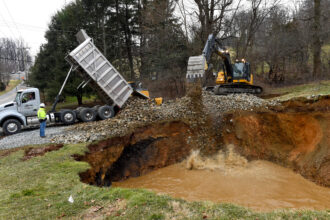The Department of Justice’s Office of Environmental Justice is puny by federal agency standards. But advocates have said for years that it punches well above its weight.
In 2022, OEJ lawyers filed a lawsuit against the city of Jackson, Mississippi, after a water treatment plant failed. Some 160,000 residents, along with hospitals, fire stations and schools, had been left without safe drinking water, and OEJ helped get an independent manager appointed to oversee improvements.
The following year, OEJ was involved in a lawsuit that sought to curb hazardous chloroprene emissions from a chemical plant in LaPlace, Louisiana, where approximately 1,200 children attending a nearby school were potentially being exposed to a known carcinogen.
And in 2024, the U.S. attorney for the Western District of Michigan secured a $750,000 fine against several companies and individuals who had conspired to disable the pollution-control systems of hundreds of diesel trucks near the city of Grand Rapids—in part due to coordination and guidance OEJ provided.
“This case is one of the largest of its kind ever charged in the United States and today’s sentences send a clear message that polluters who break environmental laws will be held accountable,” Mark Totten, who was then the district’s U.S. attorney, said following the trial’s closure.
But the office—which requested just $7.9 million of new funding in 2023—has become one of the many casualties in President Donald Trump’s blitz to slash government spending and dismantle his predecessor’s climate and environmental justice legacy. Research has long shown that low-income neighborhoods and communities of color are more frequently exposed to industrial pollution and suffer higher rates of health conditions, such as asthma.
The Trump administration closed the office early last week, Reuters reported, putting OEJ’s 20 staffers on leave, along with 168 employees who worked in the Environmental Protection Agency’s Office of Environmental Justice.
One federal prosecutor’s office and another legal organization that worked closely with OEJ declined to comment on its closure, with one group expressing fear that its ongoing litigation could be jeopardized if it drew attention from the Trump administration.
The Justice Department’s Office of Public Affairs also declined to comment on this story.
But environmental advocates were quick to criticize the Trump administration, saying it had shut down a federal office that not only helped to enforce important environmental laws, but one that was actually saving taxpayers money.
“Employing [OEJ staff] is a small expense compared to the tens of millions of dollars they recover from polluting corporations each year,” Kieran Suckling, executive director and co-founder of the Center for Biological Diversity, said in an email. “This is the opposite of government waste and inefficiency.”
In 2022, just seven cases that OEJ prosecuted, or assisted in prosecuting, resulted in fines, settlement agreements or cleanup efforts that totaled more than $250 million, according to its 2023 annual report. Environmental advocates downloaded that report before Trump officials deleted it from government websites last week.
Sam Sankar, senior vice president of programs for the environmental-law group Earthjustice, said the administration’s recent actions were “an attack on our health and our environment,” and that without federal staff to enforce regulations, “our environmental laws are nothing more than words on paper.”
Merrick Garland, who served under President Joe Biden as the U.S. attorney general, established OEJ in early 2022. The move came as part of the Biden administration’s larger effort to integrate the idea of environmental justice across all federal agencies.
Shortly after it was created, Gwendolyn Keyes, a former EPA official, declared that the new office would “be a force multiplier for EPA Administrator Michael Regan’s commitment to increase inspections and environmental enforcement in overburdened and vulnerable communities.”
“Losing this critically important federal support at a time when these communities need it more than ever will create challenges and impacts that will last well beyond the current administration.”
— Chandra Taylor-Sawyer, Southern Environmental Law Center
OEJ helped to expedite federal prosecutions for environmental violations in historically overburdened neighborhoods by increasing coordination between U.S. attorneys’ offices across the country, as well as with the public, the agency’s 2023 report said. Part of that effort was establishing an environmental justice coordinator in all 94 U.S. attorneys’ offices.
The DOJ office also set a series of standards for federal prosecutors to follow, directing them to prioritize cases in neighborhoods historically overburdened by pollution, seek timely remedies for enforcement and increase public outreach and listening sessions.
Chandra Taylor-Sawyer, an attorney for the Southern Environmental Law Center who leads its environmental justice efforts, said that OEJ helped provide another avenue for communities that have been historically overburdened by pollution to seek recourse. She also said that the office’s ability to provide not only legal tools but also collaboration between agencies was an asset to the public.
“Losing this critically important federal support at a time when these communities need it more than ever will create challenges and impacts that will last well beyond the current administration,” she said.
In a memo sent to DOJ employees last week by Pam Bondi, Trump’s newly installed attorney general, she told staff that the Justice Department was rescinding Biden-era environmental justice directives that the president believes have overburdened businesses with regulation. “Going forward, the department will evenhandedly enforce all federal civil and criminal laws, including environmental laws,” the memo said.
But Suckling said the move will ultimately cost U.S. taxpayers more money, not less, pointing to OEJ’s 2023 report, which listed dozens of convictions and legal settlements reached with companies that had violated federal laws, including the Clean Air Act and Clean Water Act.
“That report shows how this small, highly efficient program saves city, state and federal agencies tens of millions of dollars each year by forcing industrial polluters to clean up their illegal pollution,” he said. “Without OEJ’s legal judgments and settlements, taxpayers are forced to clean up the illegal pollution.”
About This Story
Perhaps you noticed: This story, like all the news we publish, is free to read. That’s because Inside Climate News is a 501c3 nonprofit organization. We do not charge a subscription fee, lock our news behind a paywall, or clutter our website with ads. We make our news on climate and the environment freely available to you and anyone who wants it.
That’s not all. We also share our news for free with scores of other media organizations around the country. Many of them can’t afford to do environmental journalism of their own. We’ve built bureaus from coast to coast to report local stories, collaborate with local newsrooms and co-publish articles so that this vital work is shared as widely as possible.
Two of us launched ICN in 2007. Six years later we earned a Pulitzer Prize for National Reporting, and now we run the oldest and largest dedicated climate newsroom in the nation. We tell the story in all its complexity. We hold polluters accountable. We expose environmental injustice. We debunk misinformation. We scrutinize solutions and inspire action.
Donations from readers like you fund every aspect of what we do. If you don’t already, will you support our ongoing work, our reporting on the biggest crisis facing our planet, and help us reach even more readers in more places?
Please take a moment to make a tax-deductible donation. Every one of them makes a difference.
Thank you,













